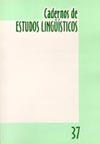Resumen
-Citas
CHOMSKY. N. & M. Halle (1968). The Sound Pattern of English . New York: Harper& Row.
CROWLEY. T. (1982). The Paamese Language of Vanuatu (Pacific Linguistics, Saies B, no. 87). Canberra: The australian National University.
GOLDSMITH, J. A. (1990). Autosegmental and Metrical Phonology. Oxford, UK: Blackwell.
GOLDSMITH, J. A. (1993). Harmonic Phonology. Em. J. A. Goldsmith (org.), The Last Phonological Rule. Chicago: the University of Chicago Press.
HALLE. M. & S. Bromberger (1991 ). Why phonology is different. Em: A. Kasher (org.). The Chomskyan Turn. Oxford. UK & Cambridge, Mass.: Basil Blackwell.
KA YE. J. (1990). Government in Phonology: the case of Moroccan Arabic. Em: Linguistic Review 6. p. 131-169.
LAKOFF. G. (1993). Cognitive Phonology. Em: J. A. Goldsmith (org.). The Last Phonological Rule. Chicago: the University of Chicago Press.
PRICE. A. & P. Smolensky. (1991). Optimality. Trabalho apresentado na Arizona Phonology Conference 3. University of Arizona. Tucson .
PRICE. A. & P. Smolensky. (1993). Optimality Theory: constrain interaction in Generative Grammar. RuCC Technical Report 2. Rutgers University Center for Cognitive Science. Piscataway. N.J.
PRICE. A. & J. McCanhy (1995). Prosodic Morphology I: Constraint interaction and satisfaction. Ms.. University of Massachusetts, Amherst, e Rutgers University. New Brunswick. New Jersey.
RUSSELL K. (1997). Optimality Theory and Morphology. Em: D. Archangeli & T. Langendoen (orgs.). Optimality Theory: an overview. Malden. Mass. & Oxford. UK: Blackwell.
Se otorgan a la Revista CADERNOS DE ESTUDOS LINGÜÍSTICOS todos los derechos de autor relativos a los trabajos publicados. No se devolverán los originales. En virtud de su aparición en esta revista de acceso abierto, los artículos son de uso gratuito, con la debida atribución, en aplicaciones educativas y no comerciales.

